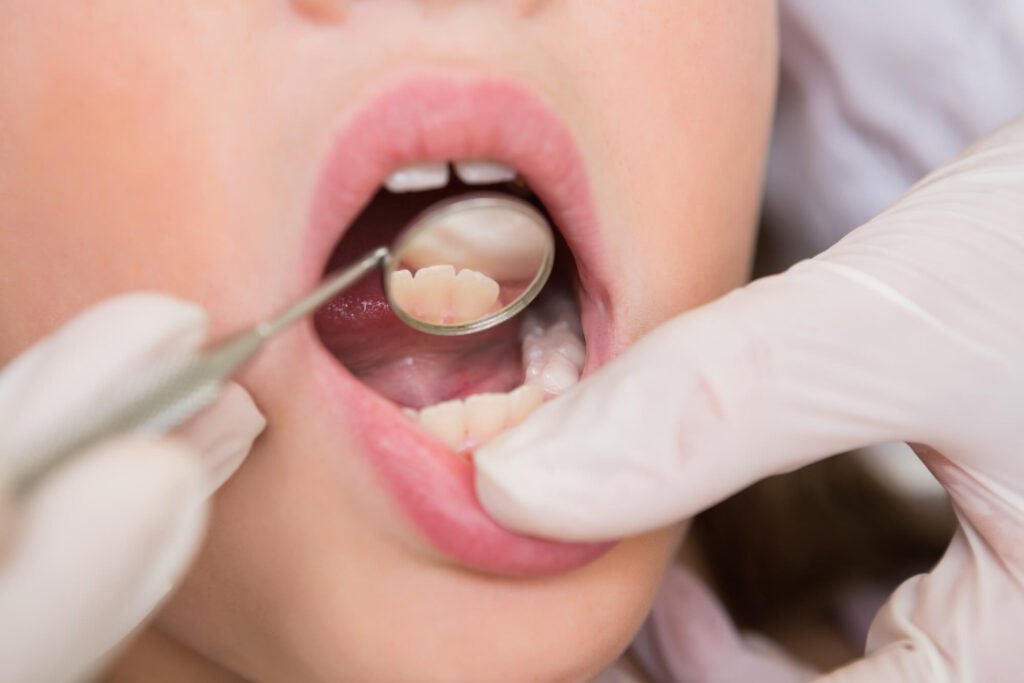Although permanent teeth eventually replace baby teeth, the best family dentist in Cameron Park encourages parents to help their kids keep their primary teeth healthy. Otherwise, minor oral health problems can quickly lead to more significant issues such as infections, speech development problems, difficulty chewing, and problems with mental and social development.
We’ve outlined the most common oral health issues affecting children and how to prevent them.
What Are the Common Oral Health Issues in Kids?
1. Childhood Caries
A breastfed infant who falls asleep with milk in their mouth or a child who takes milk to bed or always has a bottle or sippy cup in their hand is at risk of developing childhood caries or baby bottle tooth decay.
When their teeth are constantly in contact with sugary drinks, such as milk, formula, fruit juices, or sugar water, the bacteria in their mouth feed on the sugar and produce acid that weakens the tooth enamel.
Leaving decayed teeth untreated can cause pain and make chewing and eating difficult for the child. Unless baby teeth are healthy, they won’t be able to guide the child’s permanent teeth into their correct positions. As a result, children with decayed or damaged baby teeth are at risk of having crowded or crooked permanent teeth.
Additionally, childhood caries can also lead to an abscessed tooth. If left untreated, this oral health issue can cause the infection to enter the bloodstream and spread elsewhere in the body.
How to Prevent Childhood Carries:
- Feed your breastfed infant only when they’re hungry.
- Remove your breast from your infant’s mouth when they fall asleep.
- Wipe your infant’s teeth and gums with a wet cloth or gauze after each feeding to eliminate bacteria-forming plaque and sugar buildup.
- Avoid giving them sugary drinks or adding sugar to their food. Water should be the only drink they take to bed or carry around all day.
- By your child’s first birthday, encourage them to move to a sippy cup filled with plain water to lower their teeth’s exposure to sugars.
- If your drinking water isn’t fluoridated, ask your family dentist about fluoride supplements or treatments your toddler may need.
- Ask your family dentist about dental sealants.
2. Thumb Sucking
Since the sucking reflex is emotionally comforting and relaxing for babies, it’s normal and healthy for them to suck their thumbs, pacifiers, or toys. However, when thumb sucking continues past the age of five, this habit can cause dental problems when their permanent teeth come in.
Although the frequency, intensity, and duration of their thumb-sucking habit determine how much it affects their permanent teeth’s growth, it will create an overbite as it pushes teeth out of alignment. Besides leading to bite issues, thumb sucking causes the child to have difficulty pronouncing words correctly. In addition, this habit can cause malformation in the roof of the mouth and misalignment in the upper and lower jaws.
How to Help Your Child Stop Thumb Sucking:
- Take your child’s fingers out of their mouth once they’ve fallen asleep.
- If your child wants to break the habit, try covering their thumb with a band-aid as a reminder.
- Offer encouragement and positive reinforcement, such as giving praise or rewards for successfully avoiding the habit. Negative reinforcement such as nagging, scolding, and punishments are typically ineffective because they’ll drive the child back to the habit and use it as a security mechanism.
- Determine why your older child is thumb-sucking by identifying the stresses they face. Offer guidance in correcting the situation to make it easier for them to break the habit.
- Ask your family dentist about dental appliances your child can wear in the mouth that make sucking more difficult and less pleasurable.

3.Tongue Thrusting
Tongue thrusting is another natural reflex that helps nursing and bottle-fed babies. This habit involves thrusting the top of their tongue against their lips, allowing them to seal their mouth for swallowing.
Like thumb sucking, tongue thrusting pushes the child’s teeth out of alignment as the tongue exerts pressure against their front teeth. Unless this reflex fades as the child ages, it will create an overbite and interfere with proper speech development.
How to Help Your Child Stop Tongue Thrusting:
- Take away pacifiers that your child uses.
- Encourage your child to create new muscle memory for their tongue to rest when swallowing. Start by teaching them to press the tip of their tongue against the gum behind their upper front teeth. Next, instruct them to bite their teeth together and swallow while keeping their lips apart.
- Contact a speech pathologist. They can develop a treatment plan to help your child develop a new swallowing pattern and increase the strength of their chewing muscles.
4. Lip Sucking
Lip sucking involves placing the lower lip between the upper and lower teeth and repeatedly sucking on it. While lip sucking may occur by itself, it can also occur in combination with thumb sucking. If the habit persists, it can cause dental misalignment and difficulty speaking.
How to Help Your Child Stop Lip Sucking:
- Use positive reinforcement. Offer a hug when they show frustration.
- Use a lip balm to provide a distraction and improve the health of your child’s lip tissue.
- Divert your child’s attention during stressful situations by introducing positive activities.
- Offer water to hydrate their lips and provide a distraction.
- Avoid giving them sugary drinks that encourage them to suck their lips.
- Offer sugar-free candies to distract them from their lip-sucking habit.
5. Early Tooth Loss
Tooth decay, lack of jaw space, or an injury can lead to premature tooth loss. When a child loses baby teeth long before their permanent teeth come in, the adjacent baby teeth can shift or tip.
In addition, there won’t be enough room for permanent teeth when they try to emerge into their correct positions. As a result, their new teeth will likely emerge tilted, potentially causing dental misalignment, malocclusion, and TMJ issues.
How to Address Premature Tooth Loss:
- Ask your family dentist about space maintainers. These plastic or metal dental device holds open the space left by the missing tooth. Once their permanent teeth emerge, the dentist will remove the space maintainer.

Looking for the Best Family Dentist in Cameron Park?
At Forest Ridge Dental Group, our patients always come first. If you’re ready to enjoy an exceptional dental experience, contact us today to make an appointment.



